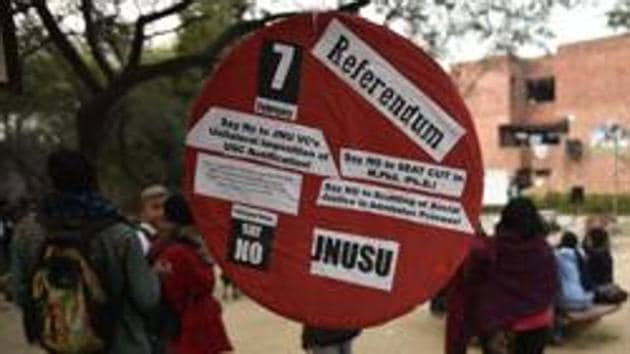Don’t cut M.Phil/Ph.D seats in JNU. It will stifle research
The UGC regulations that call for ‘Minimum Standards and Procedure for Award of M.Phil/Ph.D Degrees’ have been implemented in JNU with an uncalled-for haste. This has resulted in an 83% seat cut, undermining the intended quantity and access to research, especially for students from socially deprived sections and far flung areas of India.
The University Grants Commission (UGC) issues fresh regulations for ‘Minimum Standards and Procedure for Award of M.Phil/Ph.D Degrees’ in May 2016. This is for the second time since 2009 that the UGC has emphasised the need for maintaining minimum standards of research across the country.

Unfortunately, these regulations are turning out to be a nightmare for the Jawaharlal Nehru University (JNU), because the university administration has interpreted these ‘minimum’ benchmarks as the maximum research standard. Consequently, it has effected an 83% seat cut in MPhil/PhD admissions for 2017-18, on the pretext of contested calculations that existing faculty members have many more students under their supervision than what the UGC regulations stipulate. The unique deprivation points system in JNU admissions, which attempts to provide a level playing field to the students from socially disadvantaged groups, has also been done away with for MPhil/PhD admissions. This controversial decision has led the JNU administration into a court battle against its own academic community.
Research occupies a unique place in formal education. School education is about introducing students to a range of facts. Undergraduate and postgraduate education initiates students into understanding diverse perspectives about facts along with cultivating the ability to discern how diverse perspectives often constitute divergent sets of facts in society. While these levels of education hone the capacity to process the complexity of received thought, it is finally at the research stage that students start making original contributions to the archive of knowledge. Any nation that is committed to its intellectual self-reliance will thus be interested in nourishing a large pool of scholars and researchers capable of independent, critical thinking and pushing the boundaries of knowledge.
However, according to the MHRD’s All India Survey on Higher Education, 2016, less than 0.5% of the total students enrolled in higher education in India are at MPhil/PhD levels. Enrolment at under-graduate level is 79.3%, post-graduation is 11.3%, with the remaining students in diploma, certificate and PG diploma courses. The Report notes that “the student enrolment from UG going higher to PG is thus decreasing steeply.” This adverse trend can only be to the country’s detriment.
In such a context, it is ironic that a research university like JNU that has traditionally had over 60% enrolments at MPhil/PhD level, about 25% students at post-graduation level and the rest at under-graduate and part-time course level, has been pushed into a corner, despite it winning accolades for consistently high research standards and innovative, interdisciplinary learning. The myopic interpretation of research standards, which assesses quality not in terms of research output but solely in terms of a rigid researcher-supervisor ratio, is also undermining the intended quantity and access to research for a new post-OBC-reservation generation of students from the socially deprived sections.
Unlike many centrally funded universities, JNU is known for the diverse, all-India composition of its student body, which is facilitated by the deprivation point scheme. This gives additional weightage based on the intersectionalities of gender, regional and social deprivation in admissions. Consequently, the university is able to retain over 50% female students at research levels. JNU admission data from 2015-16 show that in MPhil/PhD admissions, 45% of all admitted SC students, 55% of ST students and 40% of OBC students are females. This new generation of female research scholars are bringing fresh insights into the process of knowledge creation.
Moreover, over 40% research scholars admitted to JNU have family incomes of less than Rs.12000 per month, over 38% are from rural backgrounds and over 85% are from states and union territories other than its region of location in Delhi. The JNU administration’s decision to set aside the unique deprivation points system for MPhil/PhD programmes would reverse this socio-economically progressive as well as the regionally and linguistically diverse character of JNU.
Many universities are still in the process of seeking clarification from the UGC for synchronization of their research standards and procedures as per the new 2016 Regulations. By contrast, the haste that the JNU administration has shown in imposing these regulations, with the narrowest possible interpretation, reflects unacademic motivations. It is paradoxical that the university which has recently won the award for the ‘best central university’ from the President of India, and ranked at number two in the NIRF 2017 ranking for universities, should have to curtail access to MPhil/PhD courses in order to improve its research standards. In doing so, the JNU administration is also undermining the sanctity of its own Jawaharlal Nehru University Act, 1966, which provides for institutional autonomy.
This move has not only closed the doors of JNU to hundreds of aspiring research scholars, but also imperilled its progressive and socially diverse character. Those swearing by nationalism will end up doing a great disservice to the nation.
Albeena Shakil is assistant professor, OP Jindal Global University





